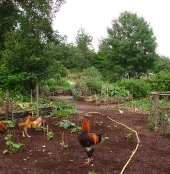I've been following this conversation with both interest and frustration. I would consider myself a "post-primativist" feral permaculturarist at this point in terms of mindset, and while I am completely in support of the OP's mission and would love to see it come to fruition, I find it troubling how linearly the relationship between horticulture and hierarchy is being viewed here. I also would like to speak out about the role that ideology has been playing out in this discussion, and how dangerous it can be in the context of a larger movement (the permaculture movement). The primativist ideology, like all ideologies, tends to see things in black and white, and I don't think this is a constructive way of looking at the world, especially within the context of our shared global struggle. I was deep into the primativist ideology hole until I read Ted Kaczynski's critique of John Zerzan's work (
http://theanarchistlibrary.org/library/ted-kaczynski-the-truth-about-primitive-life-a-critique-of-anarchoprimitivism). He rips Zerzan's work apart by looking at his sources and realizing that most of what Zerzan quotes as proof of primative human's wonderfulness is no where to be found in the sources cited! I have noticed the same thing going on in this very thread, the references to "The Art of Not Being Governed" (which I started reading after following this thread) must be to a different book than the one I picked up!
A suggested "post-primativist" work is Ran Prieur's "Beyond Civilized and Primative" (
http://ranprieur.com/essays/beyondciv.html). Good exploration of why go beyond the ideology, and of how much that opens up the possibilities for us!
Hunter gathering and horticulture can both exist in harmony, in fact, I think you would be hard pressed to find an example of any society that explicitly practiced one or the other (barring the Inuit example). From my perspective, something as small as breaking the stems of certain plants, or staying in one place long enough to build up a concentration of seeds from food plants, would be enough to count as a form of horticulture. I would like to propose that a new term gets used to remove the charges behind the terms "HG" and "horticulturalist." For example, indigenous land management, with that term representing a whole range of possible ways of subsisting.
Primativist ideology sells the idea that simply by adopting a hunter gatherer lifestyle we will reach the optimal state of human being, and cure all of our earthly woes, but I consider that a cop out. It is a much more difficult (and in my opinion, important) task to actually form a relationship with a landbase and to form a unique culture that inhabits and takes part in that ecosystem, and that relationship will not simply fit into some linear model of (HG/non-hierarchal<--->Horticultural/Hierarchal). The ideology says that if we live as hunter gatherers that an egalitarian lifestyle will be assured and life will be gold, but the world just ain't that simple.
Much more to say on this topic, but the library is closing down and it's back to the woods for me.






 ) and so I’m trying to draw up a list of potential herbs or edibles that the chickens wouldn’t be interested in. It would be especially nice to get a perennial kitchen herb garden going; make the place more comfortable for future interns and all.
) and so I’m trying to draw up a list of potential herbs or edibles that the chickens wouldn’t be interested in. It would be especially nice to get a perennial kitchen herb garden going; make the place more comfortable for future interns and all.
